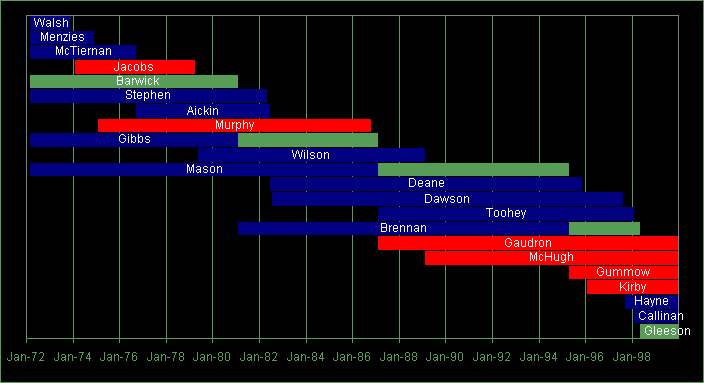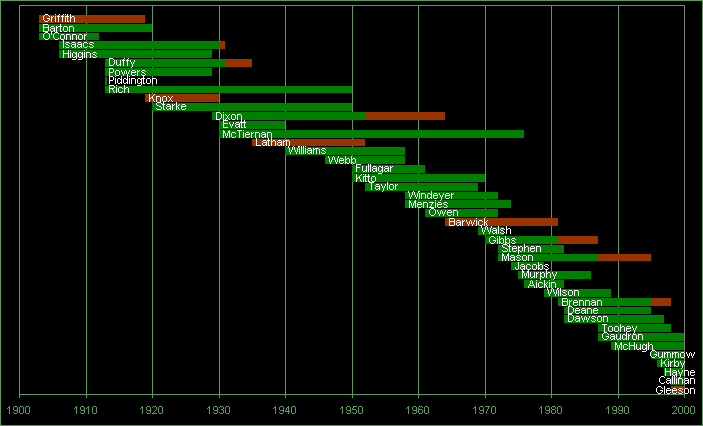Judges of the High Court of Australia: 1/3/1972 - 1/1/2000

| By party appointment: 1972-present
All Judges: 1903-present Some Recent Verdicts Links |
Nothing on this page should be taken as legal advice.

| Liberal appointments shown in blue.
ALP appointments shown in red. |
Chief Justice shown in green.
All Chief Justices shown were initial Liberal appointments to the court. The ALP promoted Mason and Brennan from Justice to Chief Justice. |

Native Title
| Case | For | Against |
| Mabo (1992): Native Title | Brennan = Mason CJ = McHugh; Deane = Gaudron; Toohey (6) | Dawson (1) |
| Wik (1996): Native Title: Pastoral Leases | Toohey; Gaudron; Gummow; Kirby (4) | Brennan CJ = Dawson = McHugh (3) |
Freedom of Political Communication
| Case | For | Against |
| ACTV (1992): Govt can't regulate political advertisements. (Brennan, Deane, Toohey and Gaudron use implied freedom of political communication) | Mason CJ; Brennan; Deane = Toohey; Gaudron; McHugh (6) | Dawson (1) |
| Nationwide News (1992): Govt can't make laws stopping certain criticism of Industrial Relations Commission. (Deane, Toohey and Gaudron raise implied freedom of political communication.) | Mason CJ; Brennan; Deane = Toohey; Dawson; Gaudron; McHugh (7) | |
| Theophanous (1994): Free Speech: Political Communication (see below) | Mason CJ = Toohey = Gaudron; Deane (4) | Brennan; Dawson; McHugh (3) |
| Stephens (1994): Affirming Theophanous | Mason CJ = Toohey = Gaudron; Deane (4) | Brennan; Dawson; McHugh (3) |
| Muldowney (1995): SA parliament can't ban 1,2,3,3 voting and can't ban someone publicizing it (Court Disagreed) | Brennan CJ; Dawson; Toohey; Gaudron; McHugh = Gummow (6) | |
| Langer (1996): Federal Parliament can't ban publicizing of 1,2,3,3 voting (a formal vote) (Majority disagreed) | Dawson (1) | Brennan CJ, Toohey = Gaudron, McHugh, Gummow (5) |
| Lange
v ABC
(1997)
Modify Theophanous to give less free speech. |
Brennan CJ = Dawson = Toohey = Gaudron = McHugh = Gummow = Kirby (7) | (0) |
| Levy (1997): Duck Hunting Protest is protected by freedom of political communication: law aimed at first days of duck hunting season is invalid. (Court disagreed) | (0) | Brennan CJ; Dawson; Toohey = Gummow; Gaudron; McHugh; Kirby (7) |
Misc
| Case | For | Against |
| Franklin Dam (1983): Stop the damming of the Franklin River. External Affairs power | Mason; Murphy; Brennan; Deane (4) | Gibbs CJ; Wilson; Dawson (3) |
CJ = Chief Justice
NB: The issues involved are far more complicated than shown in this
table. Some cases involve more questions that the one mentioned. Also,
different Judges often come to the same conclusion for differing reasons.
Nothing on this page should be taken as legal advice.
| There is implied in the Commonwealth Constitution a freedom to
publish material:
(a) discussing government and political matters; (b) of and concerning members of the Parliament of the Commonwealth of Australia which relates to the performance by such members of their duties as members of the Parliament or parliamentary committees; (c) in relation to the suitability of persons for office as members of the Parliament. In the light of the freedom implied in the Commonwealth Constitution,
the publication will not be actionable under the law relating to defamation
if the defendant establishes that:
A publication that attracts the freedom implied in the Commonwealth Constitution can also be described as a publication on an occasion of qualified privilege. Whether a federal election is about to be called is not a relevant consideration. |
This was the position of Mason, Toohey and Gaudron. Deane sided with them to produce a majority, but he wanted to go further and not worry about recklessness or reasonableness.
Just when it all seemed settled the whole thing was reconsidered in
Lange (1997).
Deane hadn't explicitly agreed with the reasoning of Mason, Toohey
and Gaudron in Theophanous (1994). This left a large enough loophole (concerning
what the majority actually agrred upon) for the Attorneys General of the
Commonwealth, Queensland, Victoria, Western Australia, the Northern Territory,
South
Australia and New South Wales to get the whole thing reconsidered.
We've now ended up with this:
From Lange vs ABC (1997):
| The test for determining whether a law infringes the constitutional
implication
When a law of a State or federal Parliament or a Territory legislature is alleged to infringe the requirement of freedom of communication imposed by ss 7, 24, 64 or 128 of the Constitution, two questions must be answered before the validity of the law can be determined. First, does the law effectively burden freedom of communication about government or political matters either in its terms, operation or effect[69]? Second, if the law effectively burdens that freedom, is the law reasonably appropriate and adapted to serve a legitimate end the fulfilment of which is compatible with the maintenance of the constitutionally prescribed system of representative and responsible government and the procedure prescribed by s 128 for submitting a proposed amendment of the Constitution to the informed decision of the people[70] (hereafter collectively "the system of government prescribed by the Constitution"). If the first question is answered "yes" and the second is answered "no", the law is invalid. In ACTV, for example, a majority of this Court held that a law seriously impeding discussion during the course of a federal election was invalid because there were other less drastic means by which the objectives of the law could be achieved. And the common law rules, as they have traditionally been understood, must be examined by reference to the same considerations. If it is necessary, they must be developed to ensure that the protection given to personal reputation does not unnecessarily or unreasonably impair the freedom of communication about government and political matters which the Constitution requires. |
You may think that Theophanous conflicts with this, but that is because
you don't "properly understand". The Court ruled:
| Although some statements in the earlier cases might be thought to suggest otherwise, when they are properly understood, they should be seen as purporting to give effect only to what is inherent in the text and structure of the Constitution. |
So goodbye to implied freedom of political communication. It was fun for three years, but now it's over. A Government can remove this freedom as along as a suitable excuse is found. As Levy (1997) has shown, the Victorian government can make laws to restrict protesters on the first weekend of the duck hunting season as long as the regulations say the restrictions are for people's safety. It doesn't matter that weaker laws apply the following weekend when conditions are equally (un)safe. The main difference bewteen the first and second weekend is not safety, but the reduced media coverage on a story a week old. Thus the laws restrict political communication, but are valid because the regulations lie about the law's purpose.
Nothing on this page should be taken as legal advice.